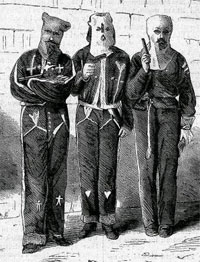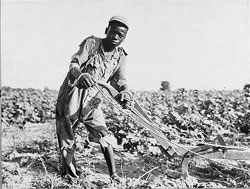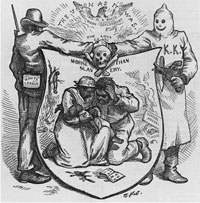


In 1865, Nathan Bedford Forrest founded a racist, terrorist group, the Ku Klux Klan, to intimidate freed slaves into not using their new rights. Wearing white robes and hoods, they would lynch, or publicly kill, black men, women, and children who did not keep to their second-class status. In response to the violence, Congress passed the Enforcement Acts in 1870 and 1871, and President Grant ordered troops to stop the KKK. However, the Supreme Court declared the Enforcement Acts unconstitutional. By the end of Reconstruction, the KKK held vast influence in the South, with many prominent citizens as secret members.
While African Americans had the freedom to pursue whatever economic activities they wanted, many chose farming because it was the only occupation they knew. Without money to buy their own land, they entered an arrangement with white landowners called sharecropping. Under sharecropping, a person would work a portion of another person's land and agree to give the owner a percentage of his or her crops. Often, freed slaves would simply rent part of the plantation they used to work as a slave.
However, the sharecropper would also have to pay rent on his house and buy food and farm equipment. During the 1870s, cotton prices dropped considerably. The former slave was left with massive debts, keeping him on the land to pay off the land owner. Many historians called sharecropping "worse than slavery" because the former master got the same amount of effort from the former slave but no longer had to provide things like food and clothing to him.
During the 1870s, the North and South alike grew tired of enforcing Reconstruction, especially when the economy collapsed in 1873. As white Southerners regained their voting rights, they retook state governments. When the federal troops left for good as a result of the election of 1876, the restored state governments no longer chose to enforce the 14th and 15th amendments. They passed laws that restricted voting rights. African-American voting participation in Southern states went from as high as 90% during Reconstruction to below 5% by 1900. The Southern government also passed laws, known as Jim Crow laws, that segregated blacks from whites in society, including in schools and public places. Blacks would remain second-class citizens in the South for nearly 100 years.